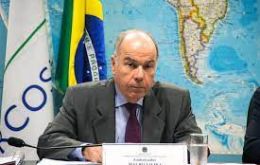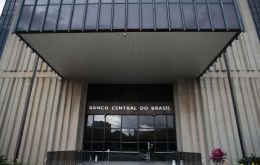MercoPress. South Atlantic News Agency
Economy
-
Saturday, March 25th 2023 - 10:33 UTC
Falklands retains global A+ investment rating; financial and political stability crucial for the achievement

The Falkland Islands Government is pleased to confirm that, following a detailed review of updated fiscal and economic information, supported by a process of confidential interviews with FIG officers and other stakeholders, including representatives of the business community, S&P Global Ratings have confirmed the sovereign rating for the Falkland Islands remains at A+ with a stable outlook.
-
Saturday, March 25th 2023 - 10:27 UTC
XXVIII Ibero-American Summit focused on economic recovery

Heads of State and Government convened in Santo Domingo for the XXVIII Ibero-American Summit which is focused on post Covid-19 pandemic economic recovery in a world hit by the conflict between Russia and Ukraine.
-
Saturday, March 25th 2023 - 10:26 UTC
Former Brazilian President Rousseff to chair BRICS Bank

Former Brazilian President Dilma Rousseff has been elected Friday to head the New Development Bank (NDB), also known as the BRICS Bank to replace Marcos Troyjo, who had held the post since July 2020. Rousseff will remain at the helm of the Shanghai-based financial institution until the end of Brazil's mandate in July 2025. Each BRICS country (Brazil, Russia, India, China, and South Africa) chairs the bank for rotating five-year terms. She will take office later next week during President Luiz Inácio Lula Da Silva's visit.
-
Friday, March 24th 2023 - 10:46 UTC
IMF explores possible political scenarios with Uruguayan presidential candidates

The annual monitoring mission of the International Monetary Fund (IMF) recently concluded its nearly two-week visit to Montevideo, providing a positive assessment of Uruguay's economy and the government's reform efforts. However, the mission also gauged the pulse of Uruguay's political landscape ahead of the 2024 elections, weekly newspaper Búsqueda informed.
-
Friday, March 24th 2023 - 10:00 UTC
Argentina's 2022 GDP shows improvement from previous year

Argentina's Gross Domestic Product (GDP - the sum of all products and services traded) grew by 5.2% in 2022, a 1.9% improvement from 2021, the National Institute of Statistics and Census (Indec) reported Thursday in a study that also showed that last year's fourth quarter GDP was 1.9% higher than that of the same period of 2021, but 1.5% below the third quarter of 2022.
-
Thursday, March 23rd 2023 - 10:53 UTC
Argentine gov't to pesify state-held securities in foreign currency

Argentina's Economy Minister Sergio Massa and his aides held a working lunch Wednesday with a group of businessmen from banks, insurance companies, and investment funds, during which the new measures adopted to control a ballooning exchange rate between the local currency and the US dollar were outlined.
-
Thursday, March 23rd 2023 - 10:51 UTC
Brazil would like to see Argentina join BRICS, FM says

Brazil's Foreign Minister Mauro Vieira told the website Metrópoles that his country would like to have Argentina join the BRICS group, but insisted that for such a move to happen it would depend on the consensus from the other bloc members (Russia, India, China, and South Africa).
-
Thursday, March 23rd 2023 - 10:48 UTC
In a display of firmness, the Fed increases the key interest rate by a quarter point

Despite concerns of a possible recession and increased banking turmoil, the U.S. Federal Reserve extended its year-long fight against high inflation on Wednesday by raising its key interest rate by a quarter-point.
-
Thursday, March 23rd 2023 - 10:45 UTC
Brazil central bank keeps rate unchanged despite Lula's government complaints, “the highest in the world”

The Brazilian Central kept interest rates unchanged for the fifth consecutive policy meeting on Wednesday, increasing concern and criticism from the government of president Lula da Silva. The bank's rate-setting committee, Copom, maintained its Selic benchmark interest rate at 13.75%. The decision, which defied intense pressure from the government of Lula da Silva, matched the expectations of analysts.
-
Thursday, March 23rd 2023 - 10:20 UTC
With prices continuing to rise, Bank of England expected to increase the basic rate to 4,25%

Following a surprise rise in UK consumer prices, the Bank of England is expected to increase interest rates for an 11th consecutive. Analysts think an increase in the Bank rate from 4% to 4.25% is the most likely outcome of the Monetary Policy Committee Thursday meeting later.
